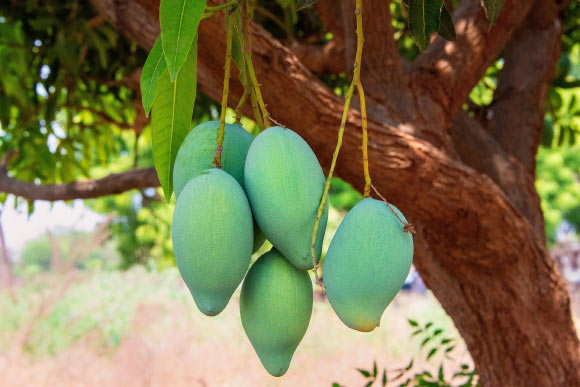In a new study, published in the journal Foods, daily consumption of mango (Mangifera indica) for 24 weeks improved both short- and long-term blood glucose control, reduced insulin resistance, enhanced insulin sensitivity, and promoted favorable changes in body composition among individuals with prediabetes — a condition that, without timely management, can progress to type 2 diabetes, heart disease, and stroke. The findings suggest that incorporating fresh mango into the diet may offer a practical, food-based strategy to support glycemic control and improve the body composition in individuals at high risk for type 2 diabetes.

The daily consumption of mango for 24 weeks improved the glycemic control, insulin sensitivity, and body composition in adults with prediabetes, which supports the potential of mango as a practical dietary intervention for metabolic health. Image credit: Mohan Nannapaneni.
According to the CDC, more than 130 million adults in the United States are currently living with diabetes or prediabetes, including an estimated 98 million individuals with prediabetes.
Projections indicate that, by 2030, nearly 40% of U.S. adults will be affected by prediabetes.
Early identification and prevention during the prediabetic stage are critical, as many individuals remain unaware of their condition until symptoms or complications arise.
Nutrition plays a vital role in glycemic control, and healthy eating supports both improved blood glucose management and long-term overall health.
In the Diabetes Prevention Program, lifestyle intervention reduced the incidence of type 2 diabetes by 58%, whereas metformin reduced it by 31% compared with placebo. As such, identifying accessible, natural strategies to mitigate these risk factors may be key to delaying the onset of diabetes and reducing associated complications.
Dietary interventions that are rich in fruits, vegetables, and bioactive compounds have demonstrated positive effects on glycemic control and metabolic health.
Mango is a tropical fruit that contains several bioactive compounds — including carotenoids, ascorbic acid, dietary fiber, phenolic compounds, gallic acid, and quercetin — that may contribute to its potential health benefits.
“It is not just the sugar content that matters, but the overall food context that matters,” said Dr. Raedeh Basiri, a clinical nutrition researcher at George Mason University.
“Our study is the first long-term clinical trial to demonstrate both metabolic and body composition benefits of mangoes in prediabetes.”
“Simply put, it’s more than the sugar in the food; it’s about the whole food. The sugars naturally found in mangos, and other fruits, are complemented by fiber and other vitamins and nutrients that offer additional health benefits.”
“Food with added sugar, such as breakfast cereals, and even low-sugar snack options, may not have the same nutritional value and can even increase diabetes risk.”
“The goal is to encourage people to include whole fruits, like mango, as part of healthy eating behaviors and practical dietary strategies for diabetes prevention.”
“Individuals at high risk of diabetes should not only focus on the sugar content of foods, but on how sugars are delivered.”
Dr. Basiri and her colleagues split study participants into two groups; one group received a fresh mango daily, while the other group was given a low-sugar granola bar each day.
Over six months, the researchers measured participants’ blood glucose levels, bodily responses to insulin, and body fat.
The findings revealed that the high-sugar mango (32 grams of sugar) proved more beneficial than a low-sugar granola bar (11 grams of sugar).
The group that consumed the daily mango showed improved blood glucose control, enhanced insulin sensitivity, and reduced body fat.
“Our findings support and expand emerging evidence on the metabolic benefits of daily fresh mango consumption in individuals with prediabetes,” the scientists said.
“The participants who consumed one average mango daily for 24 weeks experienced lower fasting blood glucose levels compared to the control group.”
“Future studies should incorporate objective dietary biomarkers (e.g., plasma carotenoids, urinary polyphenols) to improve their accuracy and validity.”
“Additionally, they should include more diverse populations and evaluate the mechanisms underlying the observed effects, such as the role of mango’s bioactive compounds in modulating insulin signaling and inflammation.”
“Longer follow-up periods and comparisons with other fruits or dietary strategies may also help clarify mango’s unique benefits to metabolic health.”
“Lastly, future studies should explore the broader health benefits of mango consumption beyond glycemic control and body composition, including potential metabolic pathway effects and gene expression changes, given that individuals may respond differently to the same foods.”
_____
Raedeh Basiri et al. 2025. Daily Mango Intake Improves Glycemic and Body Composition Outcomes in Adults with Prediabetes: A Randomized Controlled Study. Foods 14 (17): 2971; doi: 10.3390/foods14172971







